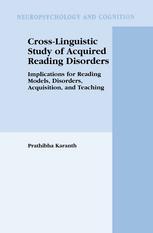

Most ebook files are in PDF format, so you can easily read them using various software such as Foxit Reader or directly on the Google Chrome browser.
Some ebook files are released by publishers in other formats such as .awz, .mobi, .epub, .fb2, etc. You may need to install specific software to read these formats on mobile/PC, such as Calibre.
Please read the tutorial at this link: https://ebookbell.com/faq
We offer FREE conversion to the popular formats you request; however, this may take some time. Therefore, right after payment, please email us, and we will try to provide the service as quickly as possible.
For some exceptional file formats or broken links (if any), please refrain from opening any disputes. Instead, email us first, and we will try to assist within a maximum of 6 hours.
EbookBell Team

4.3
18 reviewsThe acquisition ofreading, the teaching ofreading and the difficulties encountered have been ofsubstantial interest to a wide mnge ofresearchers and practitioners for centuries. Given the increasing centrality ofliteracy in modern life they are now of even greater interest to an ever widening base ofprofessionals. The study of the acquired reading disorders, though in existence for over a century, received enormous impetus with the publication of a seminal paper by Marshall and Newcombe in 1966, leading to neuropsychological model building of reading. Over the last 30 years, within the single case study design there has been extensive and exceedingly fme-gmined research on individuals with acquired disorders ofreading, in an attempt to establish the validity ofthese models ofreading and the human brain. In addition these models have had considerable influence on models of the acquisition ofreading in children and their concomitant difficulties. Much ofthis research has been in readers ofthe alphabetic scripts, particularly the opaque English script. During the last decade or so there has been increasing evidence, particularly in research on reading acquisition, that what is true ofalphabetic scripts like English may not be universally true of all of the scripts of the world. This has led to considerable research into the process of learning to read and write and on the factors affecting reading, which are the touchstone ofthe models, within broader cross-linguistic and cross-cultural perspectives.